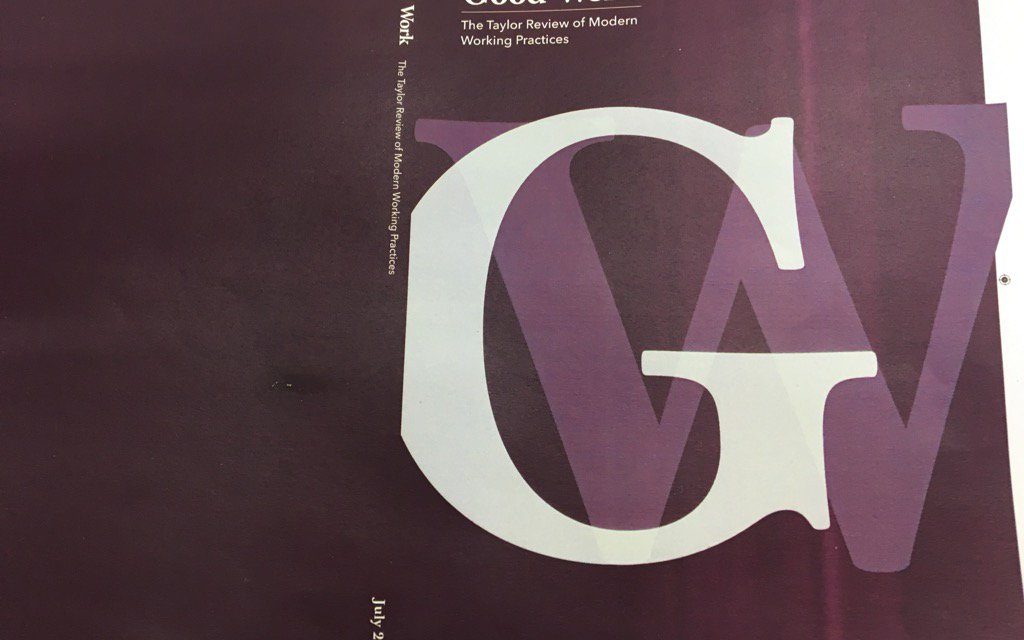
UK Government publishes Review of Modern Working Practices

“Good Work – The Taylor Review of Modern Working Practices” has been published today (11 July) and is available for download from the UK government website. The 116-page document is a wide-ranging review which looks at many aspects of employment practice and law. As Post&Parcel reported yesterday, one of the talking points of the review – led by Matthew Taylor – has been its proposal that a new category of worker – the “dependent contractor” – should be created in response to the rapid growth of both zero hours contracts and the “gig economy”.
Chapter Five of the report (entitled “Clarity in the law”) focuses on the distinctions between ‘worker’ status and self-employment.
The report points out these classifications are no longer sufficient to reflect the nuances of the modern workplace and the gig economy and so – on page 35 – it unveils its big proposal: “Government should introduce a new name to refer to the category of people who are eligible for “worker” rights but who are not employees. We recommend that the legislation refer to this group as ‘dependent contractors’.”
The Review elaborates: “It is also important that government identifies a clearer distinction between an ‘employee’ and a ‘dependent contractor’. At present, the way in which the courts have interpreted the definitions of employee and worker has led to a situation where they appear to be broadly the same but with worker being a slightly lower bar.
“We believe that in developing a new framework now is the time to consider whether this is a situation we want to continue. Our view is that it should not. The status of ‘dependent contractor’ should have a clearer definition which better reflects the reality of modern working arrangements, properly capturing those more casual employment relationships that are on the increase today – an individual who is not an employee, but neither are they genuinely self-employed.
“To do this, government should look at what the test is for worker status. Currently, an individual can have almost every aspect of their work controlled by a business, from rates of pay to disciplinary action and still not be considered a worker if a genuine right to substitution exists. We do not think this is fair, or reflects many of the opportunities presented in the modern world of work. The key employment protections which are available to ‘workers’ are there to support anyone who is not genuinely self-employed and it should not be that easy for employers to avoid any responsibilities in this way. We therefore think that it is important for Government to ensure that the absence of a requirement to perform work personally is no longer an automatic barrier to accessing basic employment rights.
“Ultimately, if it looks and feels like employment, it should have the status and protection of employment.”
In Chapter Six , the report goes on to look at how flexibility should work for both company and worker: “The gig economy adds new challenges, but the fundamental issues are prevalent in many other sectors and business models.
“While there is undoubtedly an important role for flexibility in the labour market, we believe that too many employers and businesses are relying on zero hours, short-hours or agency contracts, when they could be more forward thinking in their scheduling.
“We want to incentivise employers to provide certainty of hours and income as far as possible, and to think carefully about how much flexibility they can reasonably expect from their workers.
“Workers need to be able to make informed decisions about the work that they do, to plan around it, and to be compensated if arrangements change at short notice.”
The report also recommended: “Government must take steps to ensure that flexibility does not benefit the employer, at the unreasonable expense of the worker, and that flexibility is genuinely a mutually beneficial arrangement. With this in mind, we believe that Government should ask the Low Pay Commission (LPC), in its next remit, to advise on the impact of bringing in a higher National Minimum Wage for hours which are not guaranteed in a contract.
“This new higher rate should be set at a level which incentivises employers to schedule guaranteed hours as far as reasonable within their business. Businesses would still have the ability to offer zero or short-hours contracts, or to request that an individual works longer hours than those guaranteed in their contract, but would have to compensate the most vulnerable workers (those on low wages) for the additional flexibility demanded of them.”
On the whole, the Review suggested that the government should welcome more flexibility in the workplace, but urged that this must be managed responsibly.
The introduction to Chapter 12: Opportunities to Progress, noted: “The Review believes that genuine flexibility, whereby individuals and employers are able to agree terms and conditions that suit them both, above a statutory basic minimum, is both the key strength of the UK labour market and also a core component of fair and decent work. As a society we should be bolder in designing flexible jobs that allow people to remain and progress in the labour market as their personal circumstances change. This is good for health as well as the economy. Public agencies need to work more closely together at a local level to understand how to keep people in work and to support them to progress.”
Click here to view a PDF of the review.













